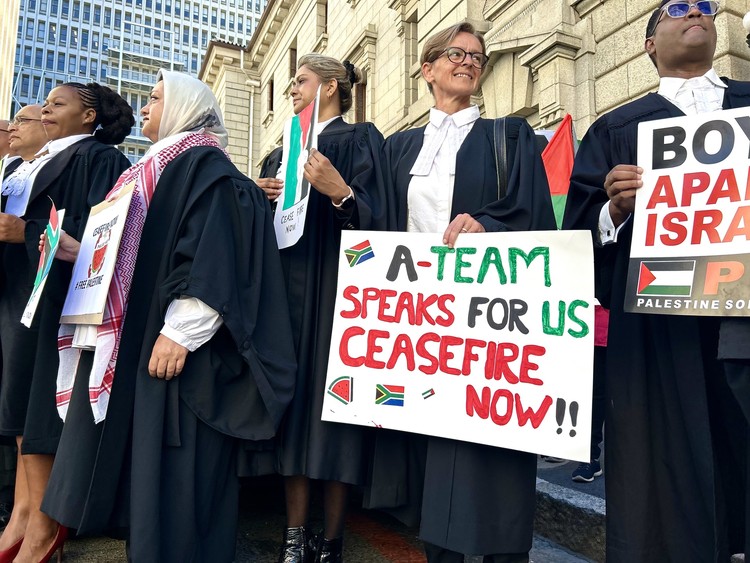
11 January 2024
Some of the protesters included lawyers outside the Western Cape High Court on Thursday. Photo: Matthew Hirsch
About 100 people gathered outside the Western Cape High Court on Thursday to express support for South Africa’s legal team at the International Court of Justice (ICJ) in The Hague, Netherlands.
The South African government submitted an application on 29 December to the ICJ. It describes the recent history of the Israeli-Palestinian conflict, the devastating effects of the ongoing war in Gaza and statements by Israel’s president, prime minister and cabinet ministers that appear to imply genocidal intent against the Palestinians.
The application asks the court to find that there is a prima facie (on the face of it) evidence that Israel is committing genocide in Gaza. It asks the court to order a ceasefire and take other measures to prevent genocide from being committed. The South Africans are presenting their case on Thursday and Israel will respond on Friday.
Thursday’s gathering outside the High Court was organised by the Palestine Solidarity Campaign (PSC) and included a number of civil society groups. Political party representatives from the ANC and Rise Mzansi also attended.
Chants of “From the River to the Sea, Palestine will be Free” and “Gaza don’t you cry, Palestine will never die” were heard. The demonstrators also sang South Africa’s national anthem.
As of Thursday, according to the Gaza health ministry, more than 23,000 people have been killed in Gaza since 7 October including nearly 10,000 children. About 2,300 people were killed in the Hamas attack on Israel on 7 October, including hundreds of civilians and about 1,000 Palestinian militants.
Seehaam Samaai, director of the Women’s Legal Centre and a member of Lawyers4Palestine, said that South Africa had a long history of standing with Palestine.
“Our presence holds a profound purpose - to support our legal team in the Hague as they present a crucial case before the ICJ, seeking justice for the Palestinian people who endure some of the most oppressive conditions in the world,” she told those that had gathered.
Activist Zackie Achmat, who is also standing for Parliament as an independent candidate this year, addressed the crowd. He said that it was important to continue the solidarity movement. “We have to ask why our government has not implemented sanctions … I welcome our stand at the ICJ.”
“Today is a very beautiful day because we see Muslims, Christians and Jewish people. We see atheists. We see people from across religions, class and race. We should continue building a movement that has such a character and that does not go to sleep,” he added.
Caitlin Le Roith, a member of South African Jews for a Free Palestine, said she was proud to be South African. “I am also proud to be a member of the legal community of which the brilliant minds that comprise South Africa’s legal team are a part. Our history and shared experience as South Africans, and the history and shared experience of the Jewish people, make South Africa’s application to the ICJ, calling on it to recognise the genocide that Israel is committing on the Palestinians in Gaza, particularly meaningful for someone like me.”
“As South African Jews, and really as peace-loving, justice-seeking human beings, we take these obligations very seriously. In particular, we are deeply committed to ensuring that “never again” means never again, for anyone, anywhere” she said.
There are expected to be several Pro-Palestine events in Cape Town this week culminating with a Global Day of Solidarity set to take place in Sea Point on Saturday.
The case brought by South Africa that is being heard at The International Court of Justice in The Hague this week is historic. It is one of the most important court cases of our time.
The South African lawyers are asking for the court to find that there is a prima facie (on the face of it) case that genocide is being committed, and therefore order a ceasefire and other measures to prevent genocide. Israel’s lawyers may try to dispute the facts about how Palestinians are being killed and how many. But they cannot with a straight face deny the genocidal and ethnic cleansing comments made by their president, prime minister and cabinet ministers. This aspect of the case is irrefutable.
If the court, whose selection process is far too influenced by state politics, dismisses the South African case it effectively means that the judges are not independent and that the world’s dominant powers care little for maintaining the international institutions of law, checks and balances established after the Holocaust of World War II.
It will bode badly for human rights globally if South Africa loses. Ukrainians facing Russian missiles, Uyghurs in China, the citizens of several African countries, and many other oppressed people across the world need South Africa to win this case.